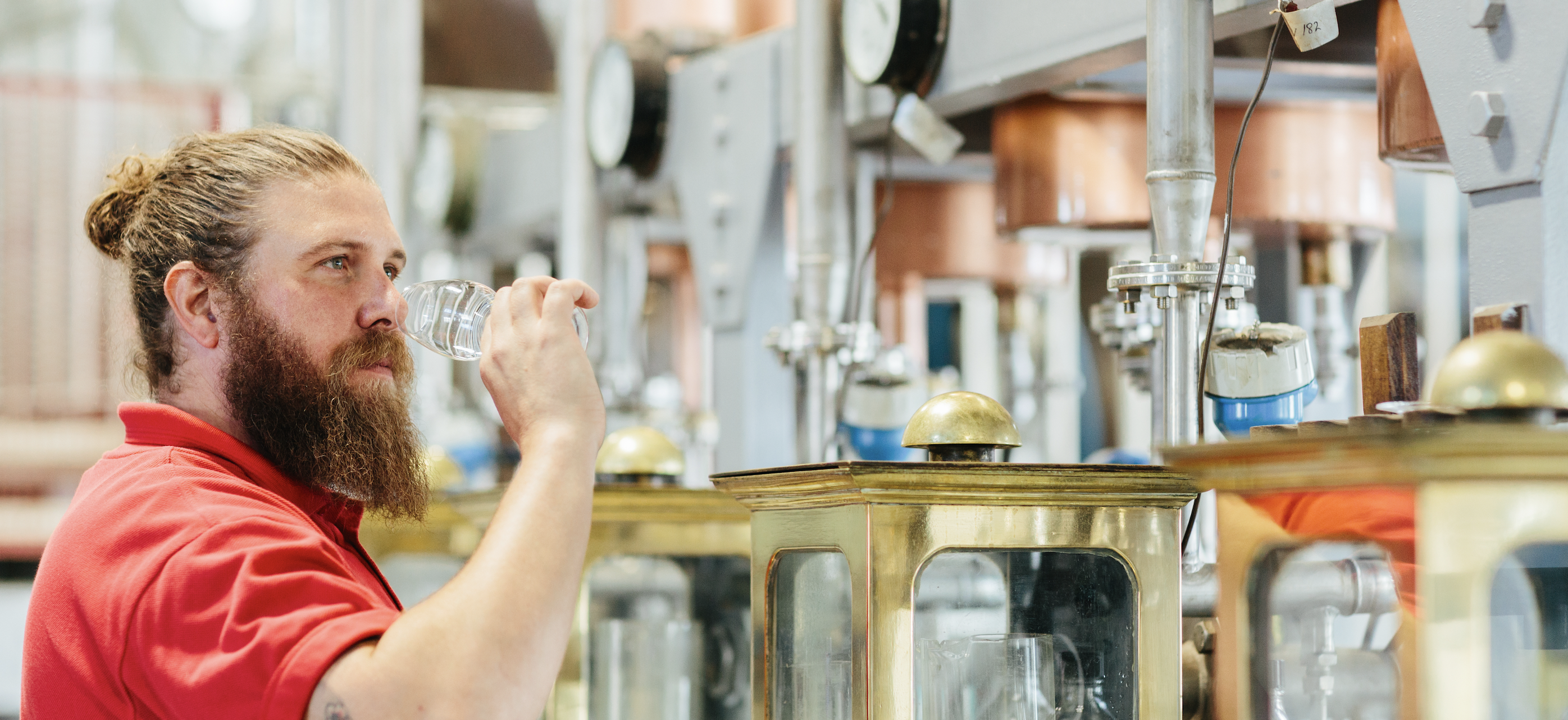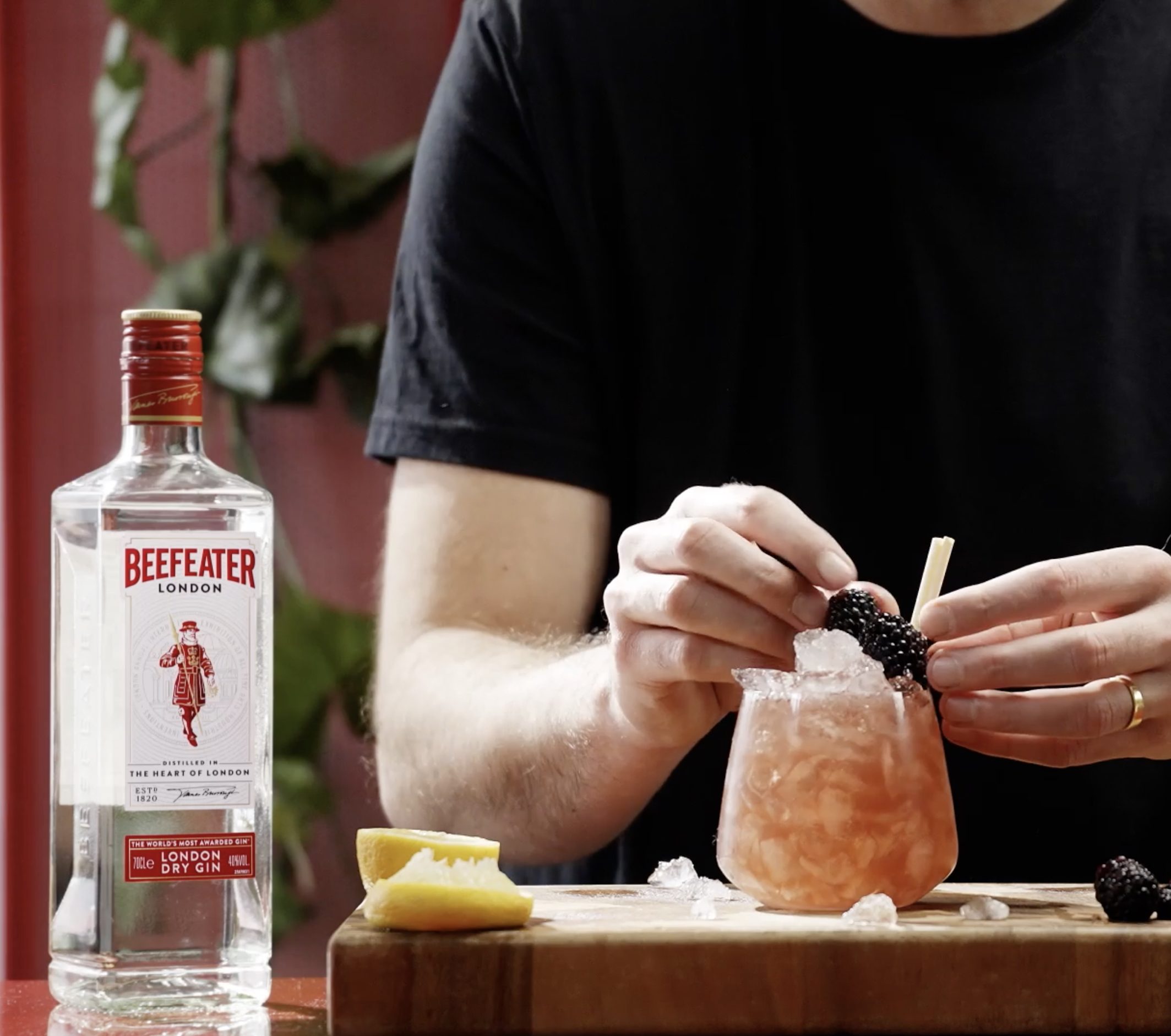Welcome to your cheat sheet for how gin is made. Buckle up, and let’s dive (g)in. Beefeater has long been a pioneer of gin- and as the World’s Most Awarded Gin*, we know a thing or two about making a great bottle.
We’ve detailed the process of making gin here. If you’re ever in London, pop by for our award-winning Distillery Tour and see how we make gin up close.
WHAT is gin?
Gin, by definition, is a neutral spirit that has been redistilled with a variety of botanicals (flavours, aromas, spices, you get the idea).
WHAT DOES ‘LONDON DRY’ GIN MEAN?
There are multiple ‘styles’ of gin- from compound to Genever- that refer to the specific rules governing the production of that style gin.
Beefeater is a ‘London Dry’ Gin, meaning we produce a gin that follows specific gin distillation methods.
- The base spirit must be first distilled to 96% ABV
- We only add water after the distillation process is complete
- Our botanicals are therefore added during distillation- giving us a distinctive character
- We only use natural botanicals
DO ‘LONDON DRY’ Gins have to be made in london?
Beefeater distils all of our gin in the urban heart of London at our home in Kennington. We are The Spirit of London, after all.
That being said, there is no rule that says London Dry gins have to be made here in London.
What are the basic ingredients of gin?
To make a gin, you need four key ingredients.
- ALCOHOL: To make Beefeater, we use a neutral distilled spirit from grains as the base for our gin. While grains are the most common ingredient, the base alcohol in gin can also be made from potatoes, sugar beets, or fruits.
- WATER: Pure, demineralised water give the botanicals space to shine.
- JUNIPER: Gin without juniper is a lot like London without Beefeater… well, it’s just not right. In order to be classed as a gin, juniper must be added. The rest of the botanicals depend on each distiller.
- BOTANICALS: From fruits, flowers and seeds, to herbs, spices and roots, these add unique character to the gin.
WHICH is beefeater gin made from?
Here at Beefeater, we use a total of nine botanicals to make our iconic London Dry Gin. In addition to our specially selected juniper, you can also find citrusy coriander seed, earthy angelica root and florally spiced angelica seed, as well as smooth almond, sweet liquorice and essential orris root. Now, it wouldn’t be Beefeater without citrus, so we add sweet lemon peel and bitter Sevillian orange peel for that extra oomph.
is gin made from vodka?
While gin and vodka can seem like they’re from the same family reunion – clear, often distilled from grains, and perfect for mixing – they’re actually quite distinct in their making.
Vodka is known for its purity and neutrality. It’s like the blank canvas of the spirit world. Vodka is typically distilled multiple times to strip away any flavours from the base ingredients, whether it’s grain, potatoes, or even grapes. The goal is to achieve a smooth, clean spirit that doesn’t shout out its origins. Gin, on the other hand, is all about the flavour. The essence of gin lies in its juniper berries, which give it that distinctive piney taste.
But here’s where it gets interesting: gin starts its life much like vodka. The initial distillation process for gin often results in a neutral spirit that could be akin to vodka. However, this is just the beginning.
After achieving this neutral base, gin takes a detour. It undergoes a second distillation where it meets a basket of botanicals such as juniper berries, coriander, citrus peels, angelica root, and a myriad of other herbs and spices. These ingredients infuse the spirit with their aromas and flavours, transforming it from a neutral spirit into the vibrant gin we know and love.
So, to answer the question, no, not all gin is made with vodka. However, they share a similar starting point. Gin begins with a neutral spirit, much like vodka, but it’s the addition of botanicals that sets it apart. It’s like vodka went to a fancy spice market and decided to reinvent itself with a zesty makeover.
Find out more about gin vs vodka.
The gin making process: Gin-erating magic
There’s quite a lot of science involved when it comes to how gin is made and it’s pretty fascinating. Beefeater has long perfected its gin-making process and we hope you’ll agree that the final product speaks for itself. There are several methods used to produce gin, but most include the same fundamental stages:
FERMENTATION: THE STARTING POINT
Every great gin begins with fermentation. Whether it’s grains (like barley, corn, rye, or wheat), potatoes, sugar beets, grapes, or even apples, the chosen ingredient is mashed and mixed with water. This converts the starches from the base ingredient into sugars which are crucial for the next bit.
Yeast is then added to this mix, and fermentation begins. Essentially, the yeast eats the sugars that have been released, converting them into alcohol and carbon dioxide.
After several days, what’s left is a kind of beer or wine, depending on the base ingredient, with an alcohol content of around 5-10%.
DISTILLATION: THE HEART OF THE PROCESS
Distillation is where the fermented mash gets transformed into a high-proof neutral spirit. This part is pivotal and involves heating the liquid to separate the alcohol from the water and other components.
As we know, however, gin is not gin unless its packed full of botanical flavour and this is why the infusion of botanicals must also be incorporated into the distillation process. There are several different ways distillation can be done:
POT STILL DISTILLATION
Pot distillation is an artisanal, old-school method of gin distillation and involves heating the fermented mash in a pot still. As alcohol evaporates at a lower temperature than water, it rises first.
The alcohol vapor travels up the neck of the still and then condenses back into liquid. This liquid is collected, and often redistilled multiple times to achieve a higher purity. After the first round of distillation, botanicals are added to the neutral spirit so that when the vapour is next collected, it’s infused with aromatic flavours. They are often left to steep in the alcohol for many hours before redistillation takes place to ensure the perfect intensity of flavours. Our chosen botanicals are soaked for 24 hours.
COLUMN STILL DISTILLATION
Also known as continuous stills, column stills are a more modern method that consist of a series of stacked mesh plates. The fermented liquid is fed into the still, and vapour rises through the plates.
Each plate acts as a mini distillation, separating alcohol from water more efficiently. This allows for continuous production and results in a very high-proof, neutral spirit.
Within the column, typically at the neck of the still, there is a basket of botanicals which the vapour flows through to take on their flavours. This method is favoured for delicate oils and botanicals that can be ruined if boiled in alcohol for an extended period and tends to produce gins with a lighter profile.
VACUUM DISTILLATION
As a relatively new method, vacuum distillation is done under reduced pressure in a vacuum-sealed chamber, allowing the alcohol to evaporate at a lower temperature and preserving the delicate flavours and aromas of the botanicals.
BLENDING AND DILUTION: THE FINISHING TOUCH
Once the spirit has been distilled with the botanicals, it’s time for the final steps. Some gins are blended with other distilled spirits to achieve a desired flavour profile.
Alcohol by volume levels (ABV) are also adjusted by adding water to make the gin palatable (or drinkable to you and me). Usually, gin is bottled at around 40-50% ABV.
Once the gin has been checked for quality, it is bottled and shipped all around the world.
Bish, bash, bosh. That’s the basics of making gin, but let’s be honest, Beefeater is anything but basic. From the initial fermentation to the intricate distillation and the artful infusion of botanicals, Beefeater gin-making is a blend of science, art, and a bit of magic. Each bottle carries the essence of its ingredients and the craftsmanship of its makers. So, the next time you’re enjoying Beefeater gin cocktails, you can appreciate the complex journey it took to make the spirit in your glass.
DISCOVER OUR DRY GIN


